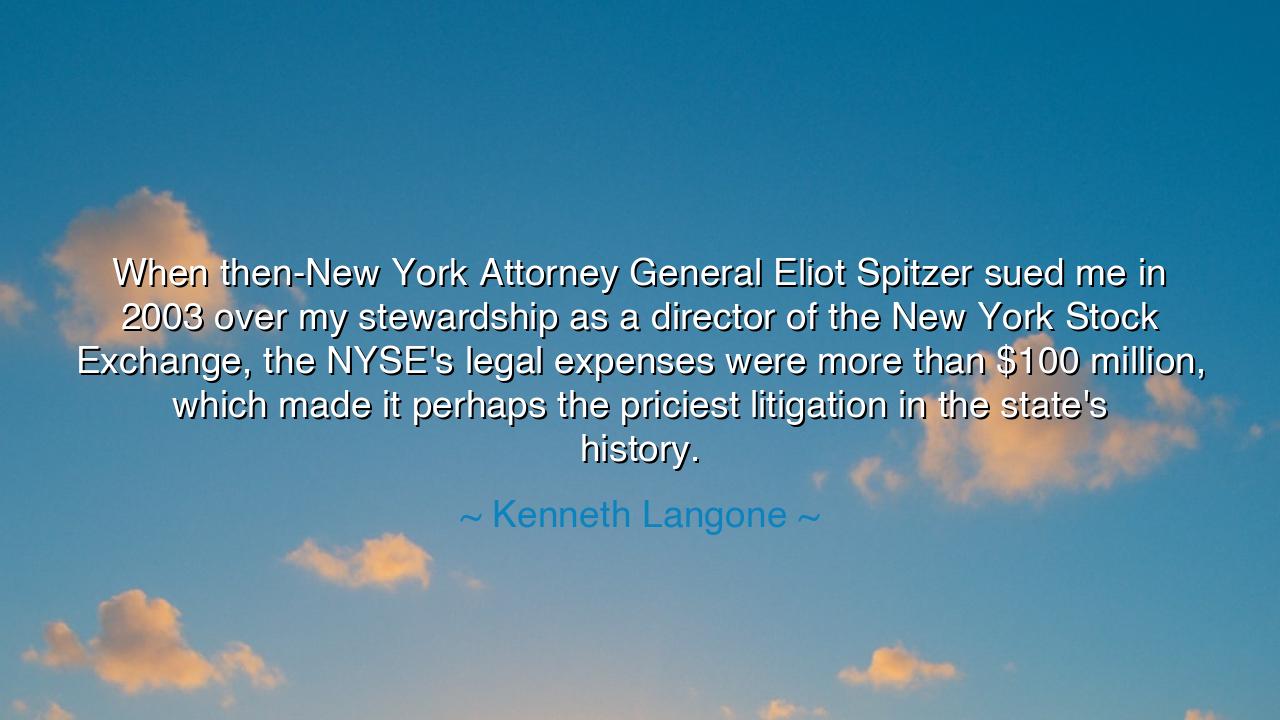
When then-New York Attorney General Eliot Spitzer sued me in 2003
When then-New York Attorney General Eliot Spitzer sued me in 2003 over my stewardship as a director of the New York Stock Exchange, the NYSE's legal expenses were more than $100 million, which made it perhaps the priciest litigation in the state's history.






In the annals of commerce and governance, few events reveal the gravity of responsibility and the weight of public scrutiny like the trials of leadership. Kenneth Langone’s words, “When then-New York Attorney General Eliot Spitzer sued me in 2003 over my stewardship as a director of the New York Stock Exchange, the NYSE's legal expenses were more than $100 million, which made it perhaps the priciest litigation in the state's history,” illuminate a lesson as ancient as civilization itself: with authority and influence comes immense accountability, and the consequences of legal challenge can ripple far beyond the individual to institutions and society.
From the courts of Athens to the forums of Rome, magistrates and stewards were held accountable for the management of public resources. A misstep or perceived misjudgment could bring tribunals, fines, or exile. Langone’s experience mirrors this timeless truth: leadership in positions of enormous responsibility invites scrutiny, and sometimes the weight of justice—or litigation—can be staggering. The $100 million legal expenditure is a modern echo of the ancient concept that governance and stewardship are never without cost, whether measured in gold, reputation, or societal stability.
History provides striking parallels. In 17th-century England, the East India Company faced investigations and parliamentary inquiries into its directors’ conduct, particularly when the company’s profits and public impact clashed with legal or ethical expectations. The stakes were enormous, as decisions affected trade, livelihoods, and the Crown’s revenues. Langone’s recounting of the NYSE litigation underscores that even in modern times, the consequences of perceived mismanagement can escalate into litigation of unprecedented scale, affecting not only the accused but the broader institution.
The philosophical resonance of Langone’s words lies in the intersection of power, duty, and accountability. Directors of major institutions are entrusted not merely with profit or efficiency, but with the trust of markets, investors, and the public. When allegations arise, they illuminate the fragile balance between authority and oversight, revealing that even the most competent stewardship is subject to the judgment of law. The cost—both financial and reputational—serves as a reminder of the gravity of governance in complex societies.
Consider a modern illustration: during the 2008 financial crisis, executives of major banks faced scrutiny over risk management decisions, many of which were legally contested. The magnitude of legal and regulatory attention demonstrated that leadership carries not only influence but exposure. Langone’s experience with the NYSE lawsuit in 2003 is a precursor to this pattern, showing that the oversight of institutions entrusted with public and private trust demands diligence, transparency, and preparedness for intense evaluation.
The practical lesson for leaders and citizens alike is profound. Stewardship of institutions, whether public or private, is inseparable from accountability. Every decision carries potential consequences, and those in positions of influence must act with prudence, foresight, and integrity. Even when one’s intentions are sound, the mechanisms of law and regulation may impose costs and demands far beyond immediate comprehension, as reflected in the unprecedented scale of the NYSE’s legal expenses.
For individuals aspiring to lead or manage, the teaching is clear: anticipate scrutiny, document decisions, uphold ethical standards, and recognize that authority brings both opportunity and risk. Prepare not only for operational challenges but also for legal, ethical, and societal review. Langone’s reflection demonstrates that stewardship is a sacred trust, and protection of institutions may demand vigilance, resilience, and substantial resources.
Thus, Kenneth Langone’s words resonate as a timeless admonition: with great authority comes great accountability, and the cost of defending stewardship can be monumental. Let all who aspire to leadership remember that influence is inseparable from responsibility, that law serves as both guide and check, and that the preservation of integrity and institutional trust requires courage, prudence, and unwavering commitment. In this, the lessons of the past converge with the demands of the present, reminding us that leadership is both a privilege and a profound obligation.






AAdministratorAdministrator
Welcome, honored guests. Please leave a comment, we will respond soon